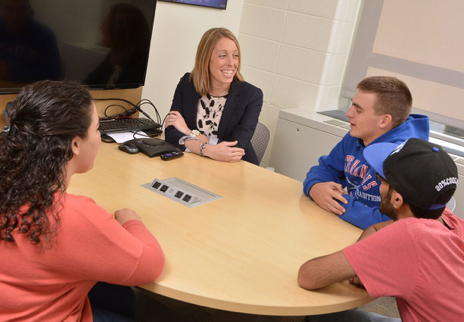Blog Entries
Job, Career, or Calling: Where Are You Heading?
More often than not, we put most of our energy into identifying the “what” of our future.
What will I do after college? What will I become? Pressure from society teaches us to think this way. As children we are asked what we want to be when we grow up, and as teens we’re asked what our college major will be. As a result, we tend to forget to ask ourselves critically important questions about the “why” of our future.
Why are you pursuing the educational or career goals that you are pursuing? Why do you feel motivated to attend college? If you have a clear sense of your fundamental “whys” (and your unique “hows”), then you can much more easily determine what you are going to do with your time; what you want to create; what role you want to fill; and what goals you want to accomplish.
Pope John Paul II reflected on what work is, what it means to us, and what work should look like in his 1981 encyclical Laborem Exercens (On Human Work). He says it is true that we are the objects of creation; but, because God made us in His own image, we also have a creative capacity ourselves.
Work is our opportunity to engage that creativity and leverage our uniqueness. The ability to contribute to the world in a distinctive way is part of the beauty of being human. His message points to a distinction between different types of work and encourages us to listen for our calling. Investigating and understanding your own “why” is a powerful strategy for those seeking to discover their calling or vocation in life, which Dr. Amy Wrzesniewski—a professor of organizational management at Yale University—conceptualizes as being distinct from a job or career:
- Job – People who see their work as a “job” have little discretion and feel a lack of engagement or meaning. People with jobs see work primarily as a necessity of life, and they would switch jobs if given the chance to earn more money.
- Career – People who see their work as a “career” generally have more discretion, feel more engaged, and may even enjoy what they do; however, their focus is on advancement. They see themselves as following a trajectory that leads to promotion, higher salary, and better work.
- Calling – People who see their work as a “calling” find it most satisfying. For them, work is a salient part of life; they are pleased to be doing it; it is a vital part of their identity; and, they believe their work makes the world a better place.
But how do we get out of just doing a job and move toward a career or even a calling? One way is job crafting, which means shaping the boundaries of your job in such a way as to make the work more meaningful.
For example, Dr. Wrzesniewski studied the experiences of hospital cleaning staff and found that some individuals viewed themselves as custodians and looked at their job as a means to a paycheck. However, others viewed themselves as helping patients and staff, promoting health, and contributing to the curing of illnesses. Because of that, those individuals consistently went above and beyond their job description (like consistently rotating the paintings on the walls in patients’ rooms) and found meaning within what others might consider a less-desirable job.
Through job crafting you can get to know yourself better and uncover the things that feed your spiritual energy, and then you can lean into those experiences with all of your passion and excitement.
The more you narrow in on what brings you fulfillment in your current experiences of work, the better you can identify future opportunities that are even more meaningful and feel confident pursuing them.
Three ways to engage in job crafting are:
- Task crafting: shaping what the job description actually is. It’s customizing certain aspects of your job in a way that makes the experience more enjoyable, more meaningful and/or something that makes you feel more connected to those you're working with or the beneficiaries of your work. This is the type of job crafting that you have the least control over because some employers don’t allow for it.
- Relationship crafting: shaping how and with whom you interact. It’s developing or redefining relationships either with coworkers, customers or other constituents in a way that makes the experience more meaningful.
- Cognitive crafting: shaping how you think about what the work is. It is not what you do; it’s what you think about what you do. This is the type of job crafting that you have the most control over and the most freedom with.
Exploring and engaging with what brings meaning to your life will influence your work for sure, but it will also influence every other aspect of your life by allowing you to live an integrated life as your full authentic self.
If you can become more in touch with who you are at a deeper level, everything else will fall into place.
Decision making processes will become easier because you’ll know what is in harmony with your essence as a human being; personal desires will become clearer; and the ambiguity of the future will feel less like a closing door and more like an open invitation.


Follow Career Development Center on Social
CDC on Facebook
Stay up to date with Career Development Center's posts on Facebook.
CDC on LinkedIn
See the latest posts on LinkedIn by the Career Development Center. Follow them on LinkedIn.
CDC on Instagram
See the latest posts on Instagram by Career Development Center.




